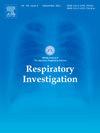下载PDF
{"title":"Factors associated with presbyphagia in patients with community-acquired pneumonia: A cross-sectional study","authors":"Yasunori Imaoka , Osamu Hataji","doi":"10.1016/j.resinv.2024.08.008","DOIUrl":null,"url":null,"abstract":"<div><h3>Background</h3><p>Presbyphagia, an age-related decline in swallowing function, is considered a precursor stage of dysphagia and a risk state that can lead to aspiration pneumonia and malnutrition. We examined factors associated with presbyphagia in patients with community-acquired pneumonia (CAP).</p></div><div><h3>Methods</h3><p>A cross-sectional study was conducted with 80 patients with CAP aged ≥65 years admitted to an acute care hospital between June 2021 and April 2024. Presbyphagia was assessed using the 10-item Eating Assessment Tool. The survey items included grip strength, body mass index, the Mini-Cog©, repetitive saliva swallowing test, tongue pressure, and evaluations for sarcopenia and frailty. Logistic regression analysis was performed to examine the factors associated with presbyphagia after adjusting for age and sex.</p></div><div><h3>Results</h3><p>Of 80 patients, 44 (55%) had presbyphagia. The presbyphagia group was older, had lower Barthel Index scores, and had a higher proportion of history of cerebrovascular accident, sarcopenia and frailty than the non-presbyphagia group. Logistic regression analysis revealed frailty (adjusted odds ratio: 3.106, 95% confidence interval: 1.161–8.313, <em>p</em> = 0.024) was significantly associated with presbyphagia.</p></div><div><h3>Conclusions</h3><p>Our results revealed a significant association between presbyphagia and frailty in patients with CAP. The relationship between presbyphagia and frailty suggests that these conditions are not caused by a single functional decline or structural change but by a combination of factors. Therefore, it is crucial to comprehensively evaluate presbyphagia in patients with CAP to provide appropriate interventions.</p></div>","PeriodicalId":20934,"journal":{"name":"Respiratory investigation","volume":"62 6","pages":"Pages 976-979"},"PeriodicalIF":2.4000,"publicationDate":"2024-08-27","publicationTypes":"Journal Article","fieldsOfStudy":null,"isOpenAccess":false,"openAccessPdf":"https://www.sciencedirect.com/science/article/pii/S2212534524001291/pdfft?md5=0500f55545a511c9d5c16e2ba9967372&pid=1-s2.0-S2212534524001291-main.pdf","citationCount":"0","resultStr":null,"platform":"Semanticscholar","paperid":null,"PeriodicalName":"Respiratory investigation","FirstCategoryId":"1085","ListUrlMain":"https://www.sciencedirect.com/science/article/pii/S2212534524001291","RegionNum":0,"RegionCategory":null,"ArticlePicture":[],"TitleCN":null,"AbstractTextCN":null,"PMCID":null,"EPubDate":"","PubModel":"","JCR":"Q2","JCRName":"RESPIRATORY SYSTEM","Score":null,"Total":0}
引用次数: 0
引用
批量引用
Abstract
Background Presbyphagia, an age-related decline in swallowing function, is considered a precursor stage of dysphagia and a risk state that can lead to aspiration pneumonia and malnutrition. We examined factors associated with presbyphagia in patients with community-acquired pneumonia (CAP).
Methods A cross-sectional study was conducted with 80 patients with CAP aged ≥65 years admitted to an acute care hospital between June 2021 and April 2024. Presbyphagia was assessed using the 10-item Eating Assessment Tool. The survey items included grip strength, body mass index, the Mini-Cog©, repetitive saliva swallowing test, tongue pressure, and evaluations for sarcopenia and frailty. Logistic regression analysis was performed to examine the factors associated with presbyphagia after adjusting for age and sex.
Results Of 80 patients, 44 (55%) had presbyphagia. The presbyphagia group was older, had lower Barthel Index scores, and had a higher proportion of history of cerebrovascular accident, sarcopenia and frailty than the non-presbyphagia group. Logistic regression analysis revealed frailty (adjusted odds ratio: 3.106, 95% confidence interval: 1.161–8.313, p = 0.024) was significantly associated with presbyphagia.
Conclusions Our results revealed a significant association between presbyphagia and frailty in patients with CAP. The relationship between presbyphagia and frailty suggests that these conditions are not caused by a single functional decline or structural change but by a combination of factors. Therefore, it is crucial to comprehensively evaluate presbyphagia in patients with CAP to provide appropriate interventions.
社区获得性肺炎患者老花眼的相关因素:横断面研究
背景老吞咽是一种与年龄有关的吞咽功能下降,被认为是吞咽困难的前驱阶段,也是一种可导致吸入性肺炎和营养不良的危险状态。我们研究了社区获得性肺炎(CAP)患者中与老吞咽症相关的因素。方法对 2021 年 6 月至 2024 年 4 月期间入住急症医院的 80 名年龄≥65 岁的 CAP 患者进行了横断面研究。采用 10 项饮食评估工具对老花进行评估。调查项目包括握力、体重指数、Mini-Cog©、重复唾液吞咽测试、舌压以及肌肉疏松症和虚弱评估。结果 在 80 名患者中,44 人(55%)患有老花眼。与非老花吞咽症组相比,老花吞咽症组患者的年龄更大、巴特尔指数评分更低、有脑血管意外病史、肌肉疏松症和虚弱的比例更高。逻辑回归分析显示,虚弱(调整后的几率比:3.106,95% 置信区间:1.161-8.313,P = 0.024)与老花眼显著相关。老花眼与虚弱之间的关系表明,这些病症并非由单一的功能衰退或结构变化引起,而是由多种因素共同作用所致。因此,对 CAP 患者的老花眼进行全面评估以提供适当的干预措施至关重要。
本文章由计算机程序翻译,如有差异,请以英文原文为准。

 求助内容:
求助内容: 应助结果提醒方式:
应助结果提醒方式:


